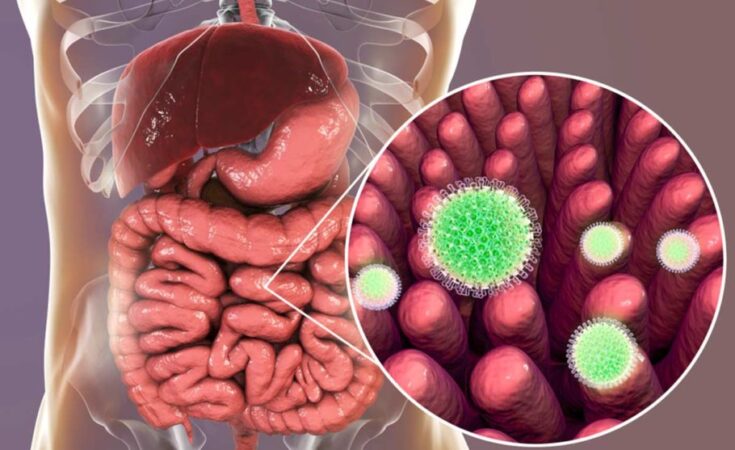Rotavirus is the leading cause of diarrhea in infants and children in developing countries, affecting more than 125 million children and infants and causing 600,000 childhood deaths each year.
Frequent diarrhea and vomiting are the common symptoms of rotavirus infection. Although most children recover at home within a week, some may require hospitalization.
Read this post to learn more about the causes, symptoms, complications, diagnosis, treatment, and prevention of rotavirus in children.
Signs And Symptoms Of Rotavirus Infection
Once a child contracts rotavirus, it may take approximately two days (incubation period) to develop gastroenteritis. Rotavirus infection may often start with a mild fever followed by digestive symptoms lasting three to eight days. The common symptoms of rotavirus in children may include
- Frequent watery diarrhea, often green or brown and foul-smelling
Increased watery diarrhea could cause dehydration due to rapid fluid loss. The following signs of dehydration are usually seen in children with rotavirus infection.
Severe electrolyte and water loss from the body can lead to shock and convulsions in children. Talking to a pediatrician and administering oral rehydration from the initial days of rotavirus diarrhea may help prevent severe dehydration in most children.
Causes And Risk Factors For Rotavirus Infection In Children
Rotaviruses are double-stranded RNA viruses from the family Reoviridae. This virus can cause gastroenteritis in children and adults. The rotavirus has several strains, and children may contract the infection with a similar strain or new strain each time.
Rotavirus spreads through the fecal-oral route. Children may contract the infection from contaminated food or water and when they touch their mouths with unwashed hands.
The virus is highly contagious, and an infected person may shed large amounts of the virus in their excreta. An infected person can transmit the virus to others by touching surfaces such as doorknobs, objects, or toys or not washing their hands properly after bowel movements.
Outbreaks in childcare centers, households, and school settings are common because rotavirus can live for a long time on surfaces. Therefore, avoiding contact with sick people may reduce the risk of getting the virus.
Children aged three months to 35 months are at an increased risk of contracting the virus. Infection is common in cooler months, and any child around a sick child or adult is at risk of getting rotavirus infection.
Diagnosis Of Rotavirus Infection
Rotavirus can be detected in stool specimens of children with gastroenteritis using various techniques such as antigen assays, electron microscopy, reverse transcription-polymerase chain reaction (RT-PCR), and virus isolation.
Children with rotavirus diarrhea can excrete large amounts of the virus during the acute phase of illness, which is often seen in electron microscopy. However, rotavirus tests are not routinely done in children with gastroenteritis since the test results do not change the treatments.
Treatment For Rotavirus In Children
There is no specific medicine for rotavirus infection in children. Therefore, symptomatic treatment and homecare measures are usually recommended. Appropriate oral rehydration therapy can help many children recover at home without complications. However, children with severe diarrhea and dehydration may require intravenous (IV) fluids.
In mild cases, adequate water intake is recommended. Doctors may prescribe oral rehydration solutions such as Enfalyte or Pedialyte to cope with fluid and electrolyte loss from the body if diarrhea lasts more than a few days. Ondansetron is prescribed for vomiting if it interferes with oral rehydration therapy.
Nitazoxanide, which is usually used to treat intestinal parasitic and protozoal infection, is shown to be promising in severe cases of rotaviral gastroenteritis. The doctor may also recommend Acetorphan (racecadotril), an antisecretory drug that inhibits enzymes called intestinal enkephalinase, to reduce stool output and duration of diarrhea.
Antibiotics are not effective since they fight bacteria, not viruses. Antidiarrheal medications are also not recommended for rotavirus infection in children because they may prevent the elimination of the virus from the digestive tract.
Home Remedies For Rotavirus Infection
Doctors may recommend the following home remedies to manage rotavirus symptoms in children.
- Give small and frequent meals instead of large meals.
- Use oral rehydration fluids as per recommendations.
- Tylenol (acetaminophen) can be given for fever as per the doctor’s instructions. Do not give aspirin to children with fever.
- Wash the hands after changing diapers or touching stool.
- Ensure good rest and sleep at home until they recover.
You may allow your child to go back to school or a childcare center only after recovery. Seek medical care if the symptoms worsen or the child has any signs of dehydration during home treatment.
How To Prevent Rotavirus Infections?
According to the Centers for Disease Control and Prevention, rotavirus vaccines can prevent rotavirus infections in children. About nine out of ten vaccinated children are protected from severe rotavirus illness, and seven out of ten are protected from rotavirus infection of any severity.
The following two rotavirus vaccines are approved for young children.
- Two doses of Rotarix (RV1) at ages two months and four months
- Three doses of RotaTeq (RV5) at ages two months, four months, and six months
As per recommendations, the first dose of any of these vaccines should be given before 15 weeks of age, and the child should receive all doses by eight months of age. Both of these vaccines are given as oral drops.
Preventing rotavirus infection can be impossible since it is highly contagious. However, washing the hands with soap and water for 10 to 15 seconds before eating and after using the washroom may protect your child from rotavirus infections.
Rotavirus is highly contagious and often causes severe dehydration in children. Getting vaccinated as per schedule may reduce the burden of this infection in most children. Over-the-counter diarrheal medications and antibiotics are not useful to manage rotavirus infection. You may contact a doctor to check your child’s hydration status during rotavirus infection. Drinking plenty of water and rehydration fluids can help prevent life-threatening dehydration.
References:
MomJunction’s health articles are written after analyzing various scientific reports and assertions from expert authors and institutions. Our references (citations) consist of resources established by authorities in their respective fields. You can learn more about the authenticity of the information we present in our editorial policy.



































